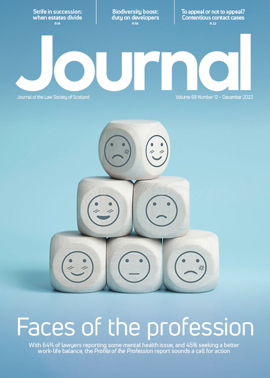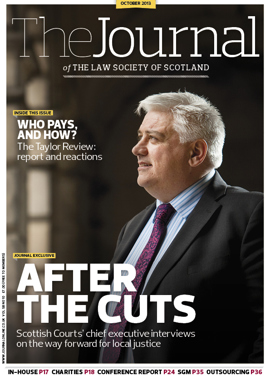Law, but not as we know it

Evolution or extinction? This year’s Law in Scotland conference presented on the face of it a rather stark choice for legal businesses. But beneath the title there was a wealth of advice, both inspiring and practical, for practices of all sizes to take on board.
The presentations of the first two plenary session star guests, Richard Susskind and Bruce MacEwen, were well trailered in our two previous issues. Both lived up to their billing.
Susskind, be it noted, told us there had been “far more change” affecting the profession in the four years since his last appearance at a Society conference than in the preceding nine-year interval. His essential point? “How to deliver more for less cost will underpin the next decade.”
MacEwen, whose normal sphere of work is the big firms, warned that “substitute” legal services businesses are more dangerous competitors than rival legal firms: they are becoming more sophisticated, “moving up the food chain”, and their revenue gains mean threefold revenue losses at established firms.
Taylor made
A star turn of a rather different type was provided by business psychologist Ros Taylor, on the theme “Ten commandments for success”. What makes a good leader? she asked. With good reason: it is one of the highest correlations in psychology that a leader’s behaviour can influence profitability, by up to 15% either positively or negatively – quite a handicap to overcome if one produces a negative effect.
Taylor does not believe in letting her audience just sit back and listen. Apart from calling for delegates’ own suggestions for her list, she had us all drawing pictures as a means of finding out the influencers in our lives, and identifying with shapes to uncover our personality traits (triangles are natural leaders, squiggles are creative thinkers, squares are practical organisers etc – all are necessary in a successful organisation). And her own top 10? Not her own, actually, but compiled from the responses of the UK’s corporate leaders, in reverse order:
10. Be confident (but not “bad confidence”, which is arrogance).
9. Strike a deal – “show people what’s in it for them to do what you want them to”.
8. Know yourself (this is where the picture exercise came in).
7. Love change (go for “big hairy audacious goals!”, she urged us, among her more colourful phrases).
6. De-stress (yes, easy to say, but you do make better decisions. Get a few minutes away from your desk regularly through the day).
5. Trust the team – you can’t be all things to all people (hence identifying people’s “shapes”).
4. Relate to people well – internally and externally. For best results, use the “8 to 1” rule: eight instances of reward or praise for each one of criticism. It’s called “the power of small wins”; it’s neglected but it’s the best thing to leave your colleagues feeling good.
3. Wanting to win.
2. Deliver the goods.
And no 1 is problem solving - in business, it means survival. But note Taylor’s take on it: “Reward success; celebrate failure; punish inaction”.
“Rate yourself on each commandment,” she concluded. “Ask, how creative is your workplace? It’s all about survival by new ideas.” Judging by her audience response, she had plenty of tips for survival for them.
Multiple streams
The streamed sessions, of course, presented a dilemma. What to choose; what to prioritise? Even with some repeated sessions, you couldn’t catch them all.
For those whose principal interest was the Criminal Justice Bill, or civil court reform, the choice was easy. And for the flavour of Stephen Gold’s stimulating challenge to high street
firms (in effect, “you have a future but you need to reinvent yourselves”), see his Opinion piece on p 5.
Also, for those with an interest in building up a practice, perhaps from scratch, Greg Shields had an excellent presentation on “Competing with the Big Brands”, and his experiences with Forster Dean, now a substantial presence mainly in north-west England. His dedication to getting both the business side and the client service right meant him being able to share a whole series of valuable lessons learned, such as “separate ownership from management: just because you own it, you don’t have to be involved in every decision”. And who could fail to be struck by the website message: “Our inspirational dream is to make our community a better place through offering a knowing helping hand”?
On a related theme, Steve Carter of Baker Tilly took the subject of “ABS - Changes to your business model”, attempting to predict how the market would change over the rest of the decade. He saw no reason why all the market changes now happening in England would not be repeated here, despite the more restrictive practice ownership rules. “Expect the unexpected” was one warning - who foresaw Stobart Barristers?
Regulation changes, marketing changes, the nature of business ownership (“the idea of a partnership bestowing ownership rights will die out”), even what will a lawyer look like, in terms of skills and roles (shades of Richard Susskind there) – all are set to bring about a transformation in the profession by 2020, in Carter’s view. The successful firms will be those that think like a business, that have proper internal management (whether or not they like doing it), and that have the investment backing to compete. And he is with Susskind also on the nature of service delivery: process driven, online, available on demand.
What now in property?
Then there was the session temptingly billed “Separate representation - what next?” Coming the morning after the SGM rejection of the idea, I thought some hasty rewriting of the presentations would have been going on. Not quite: instead, five panelists each offered us their priority for action in the conveyancing world. Were we persuaded by Coral Riddell’s call for more use of standardised documents - as in the construction and engineering world - as a means of increasing efficiency? Or her Professional Practice colleague Kaira Massie’s proposal for a new accreditation badge for conveyancers? Or IT consultant John Gailey’s vision of the virtual dealing room - a shared IT platform for transactions (not a new idea, but it needs someone - the Society, perhaps? - to take the lead and make it happen)? Or Paul Hilton of ESPC’s hope that the combined strength of our solicitors’ property centres can be put to more effective use, whether or not through one single Scotland-wide SPC? Or, finally, by the Society’s Neil Stevenson’s argument that we should take a wider look, against data from Marsh, the SLCC and other sources, to ensure that we properly understand the issues in the market before deciding priorities for action?
On a show of hands, this last proposal was the most popular by some distance, followed by John Gailey’s IT platform.
Your friendly bank?
For those not at home with all the business planning being urged, have you thought of taking advice from your bank? In the RBS session, a show of hands produced no one in the audience who thought that their banker added value to what they did - but no one who provided accounts or management accounts to their bank, or who sent information in advance of a review meeting. Is that the level of information you expect before you advise clients?, Scott Fraser asked.
If clients are looking for new and better service, share with your bank what you are trying to do: it could help you grow your business and run a more efficient business model.
To a point from the floor that it wasn’t possible for a small business to access someone with power to make decisions, Fraser replied that banks now have relationship managers accredited to deal with law firms, as well as business banking managers. “If you can present a decent financial package to a business manager, they will do their best to put a decent funding package together”, he claimed.
Evolution or extinction? There was little at conference to suggest that carrying on as before is an option, but much to provide encouragement that firms of any size can adapt and thrive.
One final thought. Steve Carter related a recent survey of English legal firms where, in essence, more appeared to anticipate changes as a result of the Legal Services Act than were planning changes for their own firms. But with reports current that regulators south of the border have serious concerns over the financial outlook for several hundred firms, he was convinced that it was the most adaptable that would survive. “I’m not predicting doom, but you need to be thinking about the future,” he concluded.
Sounds familiar? It should.
In this issue
- Jewel in the crown, or just red tape?
- In the public interest
- Sweeney: room for manoeuvre
- Lost in translation?
- EU Fundamental Rights Agency: the missing link?
- Reading for pleasure
- Opinion column: Stephen Gold
- Book reviews
- Profile
- President's column
- FM officially opens new MBH
- Feeling the squeeze
- Litigation: a numbers game
- Mythbusting! The in-house IT top ten
- Charities and the changing legal landscape
- Heir finding: the sensitive side
- Sign up to boost charity giving
- Law, but not as we know it
- All the permutations
- The truth, the whole truth...
- Shale gas: a complex process
- Expenses up to date?
- Scottish Solicitors' Discipline Tribunal
- Room at the top?
- Here comes the flood?
- SGM decision kills "sep rep"
- Outsourcing: the straight and narrow
- How not to win business: a guide for professionals
- Properly engaged?
- Ask Ash
- Sep rep: what now?
- From the Brussels office
- Law reform roundup






